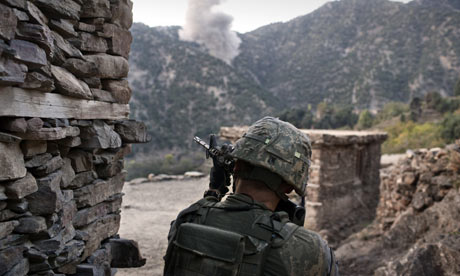 US paratrooper set to win highest military honour
US paratrooper set to win highest military honourPeter Beaumont The Observer, Sunday 4 July 2010
A US paratrooper who took part in some of the heaviest fighting in the war in Afghanistan – in the remote Korengal Valley – has become the first living nominee for the Medal of Honor since the Vietnam war.
The highest American decoration for military valour, the Medal of Honor has been awarded only eight times, all posthumously, since 1973. Two were given to snipers for the part they played in the battle of Mogadishu in 1993 in protecting a downed helicopter pilot. Since then, there have been six awarded from the wars in Afghanistan and Iraq, but none of them has been given to a surviving serviceman.
Although the Pentagon has refused to comment on the identity of the soldier, the Army Times reported on Friday that it had established that the proposed recipient was Staff Sergeant Salvatore Giunta of the 173rd Airborne Brigade. His name is understood to have been put forward after he charged into a wall of fire from Taliban fighters, who were attempting to overrun his position, to drag away another US soldier.
The episode, which took place on 25 October 2007, is described in Sebastian Junger's new book, War, which describes the fighting in the Korengal Valley. A documentary, Restrepo, made by Junger with cameraman Tim Hetherington and covering the same period, is released this weekend.
Describing his attempts to reach a wounded colleague, Giunta told Junger: "I did what I did because that's what I was trained to do. I didn't run through fire to save a buddy – I ran through fire to see what was going on with him and maybe we could hide behind the same rock and shoot together. I didn't run through fire to do anything heroic or brave. I did what I believe anyone would have done."
The award to a living soldier will be seen as helpful to the Obama administration in rallying public support for a bogged-down and costly conflict. It also risks, however, underlining comparisons to Vietnam, with which the war has become increasingly associated in the public imagination.
The White House's deliberations over whether to approve the Medal of Honor nomination came as General David Petraeus, the new commander of US and Nato forces in Afghanistan, arrived in Kabul and immediately called for unity in the civilian and military effort to turn back the Taliban and stabilise the country. Petraeus's predecessor, General Stanley McChrystal, was dismissed last month for disparaging remarks about Obama administration figures.
The Medal of Honor is awarded for acts distinguished by "conspicuous... gallantry… at the risk of his or her life above and beyond the call of duty", a criterion which inevitably meant that many of those who have been recipients have been killed while earning it. The last recipient was Sergeant Jared Monti, who was killed in Afghanistan in 2007.
Only 3,449 US servicemen have been awarded the medal since it was inaugurated by Abraham Lincoln during the civil war in 1862. Fewer than 500 were awarded in the second world war and 246 in Vietnam. Only one woman has ever received the medal.
The process of nomination is extremely long. Typical investigations can run to several thousands of pages of interviews with all surviving witnesses as well as the presentation of forensic evidence. In this case, the investigation has reportedly been done so discreetly that even the soldier's family were not aware that he was being considered. Despite speculation that the nominee is Giunta, he has not been named by the Pentagon for fear of influencing the president's final decision.
The small number of medals awarded since the beginning of the wars in Iraq and Afghanistan – and the fact that all were awarded posthumously – has triggered an intense debate, both in Congress and among senior US military officers, where pressure has been mounting to nominate a living soldier.
Last year the Army Times contributed to the debate with a trenchant article suggesting that, under the Bush administration, the award scrutiny process had become moribund and overly "politicised" because of fear that a nominee might turn out to be a future embarrassment. It quoted the 2008 case of Sergeant Rafael Peralta, who was considered for the Medal of Honor after throwing himself on a grenade in Falluja but was denied it because – some believe – he was a former illegal immigrant.
In the 1990s two investigations into why no black or Asian-American soldiers had received the decoration during the second world war suggested that racism had been at work and led President Bill Clinton to issue retrospective medals.
The growing clamour to give the medal to a living recipient is as much about the politics of an increasingly drawn-out and unpopular war as it is about individual acts of bravery.
The award, it is argued, would allow Obama to bridge the gap with a military that feels increasingly isolated and forgotten by mainstream American society. A living Medal of Honor recipient would provide a recognisable face for the conflict to help rally public support.
John Basilone, the US Marine who was awarded the Medal of Honor for his acts during the battle for Guadalcanal, was returned to the US after receiving the medal to raise money in a war bond tour and became an instant celebrity. He felt so uncomfortable that he lobbied hard to be returned to the Pacific, where he was killed
No comments:
Post a Comment